Your Guide to Mobile App Development Frameworks
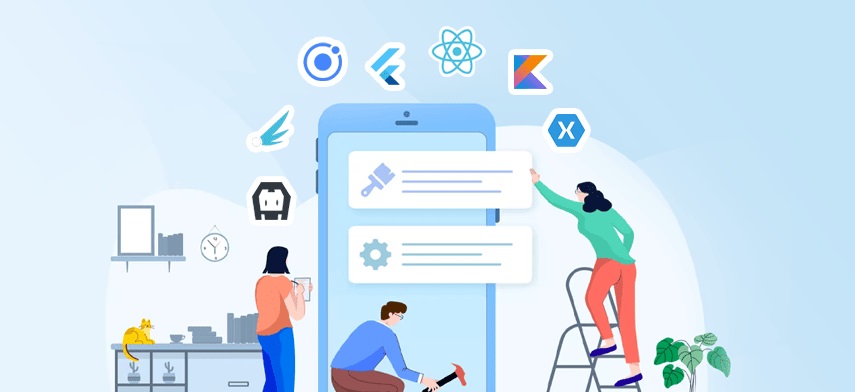
Mobile applications have become an important aspect of our lives. From online shopping to non-ending entertainment, they help us in bringing the world to our fingertips. Ever wondered how these apps are developed? Creating a mobile app is not easy as it looks like, it is a tedious process that requires careful planning, skilled app development, and use of the best technology stack available. Did you know that no one framework fits all apps? So, choosing the best-suited mobile app development framework decides your app’s success.
In a world full of apps on stores like Google Play and the App Store, making your app stand out can be tough. But there’s a trick to success in making apps. It all starts with picking the right place to build your app. Whether you’re a person with a cool idea for an app or a business owner wanting to grow online, choosing the best mobile app development platform is key. It makes your app creation journey easier. They’re like your partners in turning your digital dreams into reality. These platforms are more than just tools for coding. They create a whole system that helps you, whether you’re a creator or a business, by boosting creativity, making things efficient, and giving users a smooth experience. So, if you’re starting your digital adventure, these platforms are ready to be your friends in turning your ideas into successful apps. In this blog, let’s explore various mobile app development frameworks and help you choose the best one for your project.
Mobile App Development Frameworks and their Uses
Mobile app development frameworks are pre-built software platforms that help you to streamline and accelerate app development. These frameworks ease app development with the right tools such as debugging tools, libraries, and components. Not only do they reduce development time, but they also simplify the whole mobile app development journey with various built-in benefits such as speed, efficiency and bug-free environment. So, let’s look at two primary categories of mobile app development frameworks: Native and cross-platform.
Native Frameworks

iOS Development:
If you are a developer keen on building apps for Apple devices, you can use Swift or Objective-C with Apple’s integrated development environment, Xcode. The best part is these native tools provide access to all the iOS features and deliver high performance.
Android Development:
Next comes Android development. Android developers use Java or Kotlin, in combination with Android Studio, to create apps optimised for the Android platform. Similar to iOS development, native Android app development also offers maximum control and performance.
React Native:
Cross-Platform Frameworks

Are you tired of creating multiple codes for different platforms? Then, it’s high time you switched to cross-platform frameworks. They let you create apps that run smoothly on iOS and Android platforms with a single code. Here are some of the most notable cross-platform frameworks:
React Native:
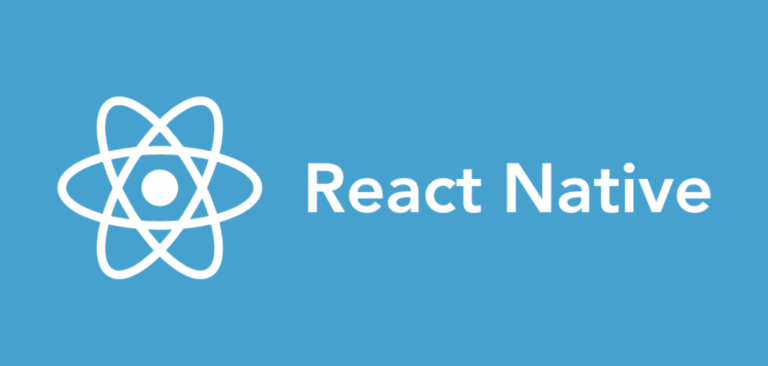
Facebook’s React Native is an open-source framework that uses JavaScript and React to create cross-platform apps. Its pre-built components allow developers to share a significant portion of code between iOS and Android. ReactNative enables you to write natively rendering mobile applications based on react, which helps you build user interfaces that target mobile platforms rather than browsers. This app makes your job of sharing the codes with anyone you wish easier, be it Android or iOS. Web developers can use their knowledge of JavaScript to create incredible mobile applications with the aid of this framework. ReactNative not only provides faster mobile development but also effective code sharing, for Android and iOS without compromising application quality or user experience. ReactNative applications run using real UI aspects rather than web views, making it look and feel different from any other apps. Here are a few features they provide:
- Cross-Platform Development: React Native enables developers to write code once and deploy it on multiple platforms, such as iOS and Android, saving time and effort in building separate codebases.
- JavaScript and React: Leveraging the familiar languages of JavaScript and React, React Native offers a smooth learning curve for developers, making it accessible and efficient for those already familiar with these technologies.
- Native Components: By utilizing native components, React Native ensures a high level of performance, resulting in apps that have a native look and feel while maintaining efficiency across different platforms.
- Hot Reloading: The hot reloading feature allows developers to see real-time changes in the app during development, speeding up the debugging process and enhancing overall productivity.
Flutter:

Are you wondering how developers build highly customized, high-performance apps that look and feel native on both iOS and Android? The answer lies in Google’s Flutter, an open-source framework. Flutter, developed by Google, stands as a robust open-source framework for app development, gaining prominence for its versatility. Flutter is designed for newbies and at the same time for professionals. Flutter covers both basic and innovative concepts of the Flutter framework. Flutter is known to work on a single codebase, unlike ReactNative, Kotlin, and Java which makes Flutter different and easier from others. Flutter is a favored tool for iOS, hybrid, and Android developers due to its capacity to produce high-quality, native user experiences for both mobile and web platforms from a single codebase. Thanks to its expressive UI, this mobile app development framework lets developers effortlessly build top-notch apps.
- Single Codebase: Flutter allows developers to use a single codebase to create applications for multiple platforms, including mobile, web, and desktop, streamlining the development process.
- Widget-Based Architecture: Its widget-based architecture enables the creation of a consistent and visually appealing user interface across different platforms, ensuring a seamless and unified user experience.
- Hot Reload: Flutter’s hot reload feature allows developers to make real-time changes to the code and see the results instantly, enhancing productivity and speeding up the debugging process.
- Expressive UIs: Flutter supports the development of expressive and flexible user interfaces, empowering developers to create visually stunning and customised designs for their applications.
- Growing Community: With a rapidly expanding community of developers, Flutter benefits from continuous support, updates, and a wealth of resources, making it an increasingly popular choice for app development.
Xamarin:
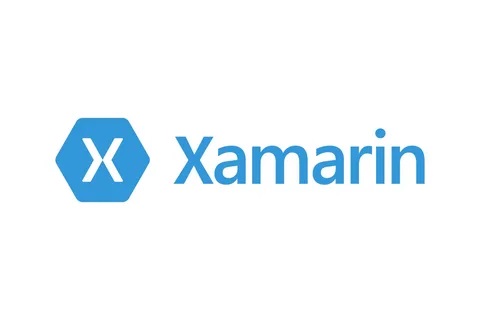
Xamarin, developed by Microsoft, uses C# and .NET to build cross-platform mobile applications. They are known to build cross-platform apps for iOS, Android, and even Windows. Xamarin is one of the world-renowned cross-platform tech stacks known for its flexibility, cost efficiency, and incredible features, enabling a much quicker and better app development. However, there are differences between Xamarin.Native (Android and iOS) and Xamarin.Forms, the key difference is that Xamarin.Forms enable developers to reuse the same user interface code over and over again to multiple Oses, whereas it is built to perform specific tasks for Windows, Android, and iOS. It provides access to a wide range of native APIs, offering maximum flexibility and platform-specific capabilities. Here are a few features they provide:
- Cross-Platform Compatibility: Xamarin allows developers to create cross-platform applications using a single shared codebase, reducing the need for separate development for iOS, Android, and Windows.
- C# Language: Leveraging the C# programming language, Xamarin provides a familiar and powerful coding environment for developers, facilitating a smooth learning curve and efficient development.
- Native-Like Performance: Xamarin offers native-like performance by compiling code into native binaries, ensuring that applications run seamlessly on each platform and providing a consistent user experience.
- Xamarin.Forms and Xamarin.Native: Xamarin.Forms enable the creation of a unified user interface across platforms, while Xamarin.Native allows for deeper platform-specific customization, offering flexibility in development.
- Visual Studio Integration: Seamless integration with Microsoft Visual Studio enhances the development experience, providing a comprehensive and efficient environment for building, testing, and debugging Xamarin applications.
PhoneGap (Apache Cordova):
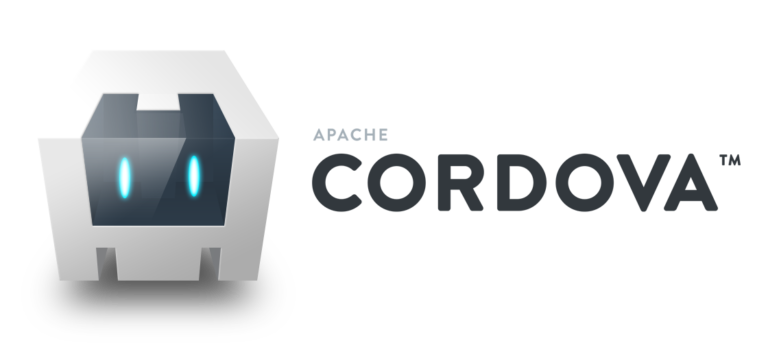
A complete transition in the world of software programs, that enables you to carry out tasks efficiently through mobiles and handleable devices. This mobile app development framework uses HTML, CSS, and JavaScript to build cross-platform apps. PhoneGap enables you to develop apps using standard web APIs. Enables you to run applications that were designed with high-end programming languages. It uses a single codebase but wraps it in a native container, allowing access to device features. It creates impressive apps utilizing the existing web technologies. One more extraordinary benefit of PhoneGap is that it completely upholds in-built device features like GPS, Camera, Phonebook, storing, etc.
- Web Technology Stack: Leveraging HTML, CSS, and JavaScript, PhoneGap allows developers to build apps using familiar web development languages, facilitating a more straightforward transition for web developers into mobile app development.
- Access to Native Device Features: PhoneGap provides access to native device functionalities through plugins, allowing developers to incorporate features like camera access, geolocation, and device sensors into their applications seamlessly.
- Simplified Development Process: With its ease of use and straightforward development process, PhoneGap simplifies mobile app development, making it an attractive option for developers looking for efficiency and a quick learning curve.
- Open-Source Framework: As an open-source framework under the Apache Cordova project, PhoneGap benefits from community contributions, updates, and support, ensuring its relevance and adaptability in the ever-evolving landscape of mobile app development.
- Cross-Platform Development: Adobe PhoneGap enables developers to create cross-platform mobile applications using standard web technologies, allowing for a single codebase deployment on various platforms, including iOS, Android, and Windows
Ionic:
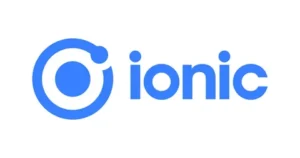
Based on AngularJS, Ionic is one of the most impressive and well-liked cross-platform app frameworks. It permits developers to utilise a blend of top programming languages such as HTML5, JavaScript, and CSS and Cordova wrapper to get to native platform regulators. Ionic empowers developers to make a perfectly creative UI alongside adding easy to use highlights into the application. Applications created with this system are profoundly intuitive and Native-like, making Ionic an ideal contender for PWA improvement too.
- Pre-Built UI Components: The framework offers a comprehensive library of pre-built UI components, streamlining the development process and enabling developers to create visually appealing and responsive designs effortlessly.
- Integration with Angular: Ionic seamlessly integrates with Angular, a popular frontend framework, providing developers with additional tools and functionalities to enhance their app development experience.
- Ionic CLI (Command Line Interface): The Ionic CLI simplifies development processes by providing a powerful command-line interface that aids in tasks such as project setup, testing, and deployment, contributing to a more streamlined workflow.
- Cross-Platform Development: Ionic facilitates the creation of cross-platform mobile applications with a single codebase, allowing developers to deploy their apps on iOS, Android, and the web.
- Vibrant Community: Ionic boasts a vibrant and active community of developers, offering support, resources, and plugins. This collaborative environment ensures that developers have access to a wealth of knowledge and solutions as they navigate the complexities of mobile app development.
Appcelerator Titanium:
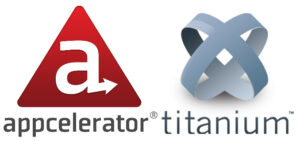
Appcelerator is one of the many cross-stage application development platforms intended to aid smoother and more straightforward mobile application development. It is an incredible method for making cross-stage applications with simply a single code base. Its essential spotlight is on streamlining of the application development process with the assistance of native parts present in JavaScript code.
- Native Components: Applications with native UI elements including navigation bars, menus, dialog boxes and alerts.
- Frameworks: Upholds Ajax and JavaScript frameworks.
- Programming: Free and open source programming.
- Native features: Titanium tablet SDK upholds iPad’s native highlights. It also makes native applications without objective-C or Cocoa knowledge.
- Enabling features: Enables Titanium mobile developers to create rich mobile applications for Android in Titanium iPhone and Android development. Enables Traditional web technologies
Choosing the Right Framework is the Key

Selecting the appropriate framework for your mobile app development project is crucial for app success. App development serves a variety of frameworks for us to pick from depending upon the type of app you build. But in today’s world, we are offered a variety of options along with a wide range of benefits and features, how to choose the best framework is a question that is a trouble to many. Dont worry! We will help you out. Here are a few points to check out before making a decision:
Project Scope:
Your framework choice depends on the complexity of your app and the features you require. While native development is ideal for complex, feature-rich apps, cross-platform frameworks are best suited for simple to moderately complex projects. So make wise choices and watch your app hit the top of the Google Play Store and App Store!
Budget:
The most important point when it comes to choosing a framework is its budget. Did you know that development costs vary for native and cross-platform development? So, if a low-budget app development is in your mind, go for cross-platform development. It typically requires less time and fewer developers, resulting in cost savings.
Community
A good community backing would be crucial and helpful so that it helps you with the frequent updates and fixes of any errors. The frameworks offered by renowned companies can be reliable and something to not worry about. When using a prevalent framework you can expect quick and easy backup from the developer community.
Performance:
Optimization is one among the most crucial features to look for when it comes to app development. It’s not only about speed, but also how efficient it is to use, and its system of handling issues in high traffic. If you are looking for an app with top-tier performance, consider native development. Native apps having direct access to device-specific capabilities offer the best user experience.
UI & UX:
A framework must be attractive and seamless. When choosing a framework, opt for the one that has an incredible user Interface and extraordinary user experience. One that enables you to work easily without having to worry about anything.
Time to Market:
Not every framework offers speedy app deployment. But cross-platform frameworks do. Known for its ability to build apps for both iOS and Android simultaneously, they offer a quicker time to market. If speed is your priority, cross-platform can be your go-to choice.
User Experience:
Consider the desired user experience for your app. Cross-platform frameworks like Flutter and React Native provide tools for creating highly customizable, native-like interfaces.
Duration of Development:
Every framework expects a certain amount of time for it to develop. Your choice of framework must enable you to use it easily with its readily available functions, aiding in the quick development of your app.
Apps Ait: Revolutionising your Digital Experience

Are you someone seeking professional assistance in mobile app development? Then, Apps Ait can be your trusted partner in app development. As a cutting-edge mobile app development company, we offer unparalleled expertise in crafting mobile applications tailored to your needs. Whether you opt for native iOS or Android app development or cross-platform frameworks like React Native or Flutter, we have unparalleled expertise to bring your vision to life.
Whether your aspirations involve Android, iOS, or a harmonious blend of both platforms, our tech-savvy team stands ready to shepherd you through the entire development spectrum — from conceptualization to deployment. Our customer-centric ethos, coupled with cutting-edge technology, positions Apps AiT as the premier choice for your mobile app development needs. Today’s dynamic mobile technology landscape demands a partner like us — dedicated to quality and innovation.
We’re dedicated to creating engaging, user-friendly, and aesthetically pleasing mobile applications, websites, and gaming mods. From conceptualization to deployment, we are with you at every step of your app development journey. With Apps Ait, you don’t have to worry about the technical intricacies of mobile app development. We take care of it all and let you focus on your core business or idea. Visit our website today, reach out to us, and watch your app make a bang in the digital market.
